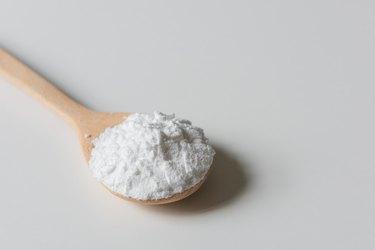
Cornstarch is a mostly flavorless powder that's used commercially in products like baby powder and cosmetics and in food as a thickening agent. As a classic example of a refined carbohydrate, cornstarch is extracted from corn through extensive processing that strips most of the original nutritional value.
There are some theories about eating cornstarch raw to keep hunger at bay and help control blood sugar, but you may be wondering if raw cornstarch is bad for you. Here's everything you need to know.
Video of the Day
Is Raw Cornstarch Edible?
You may have heard that people eat raw cornstarch for blood sugar issues and diabetes management. It's true raw cornstarch has been used as a medical intervention for cravings and blood sugar spikes in people with type 2 diabetes and hypoglycemia, per February 2014 research Diabetes Spectrum.
But the truth is, cornstarch lacks nutrition and eating it raw may cause unpleasant digestive side effects, such as gas, bloating and stomach pain, per Mount Sinai. Raw cornstarch may also harbor harmful bacteria, so you should cook it to ensure it's safe to eat.
What Is Cornstarch?
Every grain, including corn, has three main parts: the germ, bran and endosperm, according to the Harvard T.H. Chan School of Public Health. The bran and germ are highly nutritious as they contain most of the fiber, fats and B-vitamins in the grain.
Cornstarch is made solely from corn's endosperm, which is high in starch, and it's considered a processed food with little nutritional value. While starch is an important nutrient in our diet, it's not digested the same way when it comes from whole-grain corn versus cornstarch.
Whole grains have fiber, which helps keep blood sugar stable, while cornstarch does not. The carbs in cornstarch are digested more quickly, which could cause your blood sugar to spike after eating it (though you'd have to eat a good amount of it for that to happen).
Can You Eat Cornstarch Raw?
It's not advisable to eat cornstarch raw for a few reasons. For one, eating cornstarch raw may lead to digestive symptoms like gas and bloating. Heating starches during cooking helps break them down, making them easier to digest.
Cooking cornstarch into recipes also ensures any harmful bacteria it may have come into contact with are killed, which will diminish your risk of getting a foodborne illness. Typically, a recipe will call for one to two tablespoons of cornstarch.
Raw Cornstarch and Pica
If you habitually crave eating cornstarch, talk to your doctor as this is a symptom of a disorder called pica. Pica is a craving for substances not defined as food such as dirt, chalk, paper, charcoal or raw starches, per the Cleveland Clinic.
Not much is known about what causes pica, but it's been linked to iron-deficiency anemia and zinc deficiency, per August 2014 research in the American Journal of Human Biology. Adolescents and pregnant people are at a higher risk.
If you think you have pica, talk to your doctor immediately who will be able to administer blood tests to check if you have anemia or zinc or deficiency.
The Best Way to Eat Cornstarch
Though it lacks nutrition, cornstarch is a highly multifunctional product. A safe way to eat cornstarch is by incorporating it in dishes — it acts as a great thickener in recipes for sauces, soups, stews and curries.
Because cornstarch is gluten-free, it can serve as an alternative to wheat flour in recipes for people with celiac disease or gluten intolerance. But, there are also more nutritious gluten-free flour options, such as oat flour, which has significantly more fiber, protein and minerals than cornstarch.
- Foods: "Starch Characteristics Linked to Gluten-Free Products"
- Harvard T.H. Chan School of Public Health: "Whole Grains"
- American Journal of Clinical Nutrition: "Carbohydrate Quality and Quantity and Risk of Type 2 Diabetes in US Women"
- Centers for Disease Control and Prevention: "National Outbreak Reporting System (NORS)"
- Diabetes UK: "Carbs and Cooking"
- Cleveland Clinic: Pica
- Mount Sinai: "Starch Poisoning"